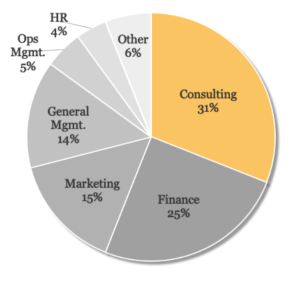By Kara Sherrer
Alongside finance, consulting is one of the most popular functions for MBA candidates to land in after graduation: 31% of the Vanderbilt MBA Class of 2019 accepted a consulting job. Many of those applicants had never worked in consulting before and used their MBA degrees to transition into the function.
We talked to Emily Anderson, Executive Director of the Career Management Center, to find out everything you need to learn before you switch into a consulting career.
You need clear motivations you can easily articulate.

MBA’19 hires by job function
Source: 2019 MBA employment report
Lots of MBA candidates want go into consulting when they arrive at school based on a general idea of what a consultant does and what the pay structure is, plus the fact that the function utilizes much of the knowledge covered in the MBA curriculum. However, these reasons aren’t enough to make applicants stand out in a crowded recruiting field. “They need to think through their motivation, because it’s a competitive process and the lifestyle can be demanding, depending on the type of firm you go to,” Anderson says.
Not all case interviews are identical.
During case interviews, applicants are presented with a hypothetical client scenario — such as entering a new market or identifying underperforming business units — and then asked how they would approach the problem. Some firms use case questions that may be more qualitative in nature, while others are more data-driven and quantitative. “It’s supposed to test a candidate on how well they can think through a complex problem (so they can) show some creativity and thought processes that could add special insight to complex business problems,” Anderson explains.
Firms want candidates to display unique insight.

Emily Anderson
It’s not enough to just regurgitate the issue at hand: Firms are looking for candidates who can view the problem in a totally new light and explain things to the client in a way that everyone can understand. As a result, applicants shouldn’t be afraid to bring a fresh perspective to the interview and case questions. “You have to be able to take some information that you’re absorbing…and present it back to these people that are making the decisions so they think ‘Oh, I’ve never thought of it like that before,’” Anderson says.
Recruiting preparation starts early.
In addition to networking with practitioners, it takes about 40 cases to get fully prepared for case interviews, which works out to about 60 hours of practice, and you’ll also need to prepare for the behavioral portion of the interview as well. Case competitions can help with this, as can programs put on by both the firms themselves and campus consulting clubs run by students. The earlier you start preparing and networking, the more confident you’ll be once the time for consulting interviews rolls around, so if you think you might be interested in a consulting position, don’t delay once you get to school.
Firms don’t expect MBA candidates to be experts yet.

The entire Consulting Trek group snaps a photo in the lobby of Deloitte’s Atlanta office
While most MBA graduates do have a few years of work experience, consulting firms can and do expect to train them up once they start an internship or job. During the hiring process, recruiters are looking for a problem-solving mindset, teamwork experience, and the ability to interact seamlessly with clients, not necessarily prior consulting experience or industry expertise. “Firms want to get people that they can train to be consultants and most (MBAs) are reasonably agnostic of special knowledge, at least at the entry level,” Anderson says.
Not everyone who goes into consulting full-time gets an internship.
Certain firms, especially smaller boutique ones, simply don’t have the workforce planning infrastructure to manage a lot of summer interns, even if they do hire MBA graduates full time. Of course, it’s ideal if you can get an internship in consulting, but if you don’t, there are still full-time consultant opportunities out there for MBA graduates.
Usually, you’ll be recruiting for a general position.
Some firms are truly generalist, so you’ll work across all industries and segments and develop some expertise from there. In others, you might get a general offer and then later choose to align with a particular sector of work such as financial services, energy, or general supply chain. But either way, your offer probably won’t be for a particular sector up front, and recruiters will be looking for more of a general fit with the firm during the interview process. “It does vary by firm a bit, (but) you very rarely…interview for a particular sector. You’re interviewing for the firm and there may be some matching process (afterwards),” Anderson says.